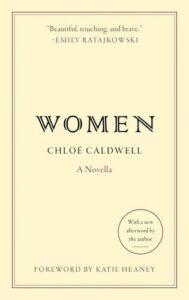
As a millennial bibliophile with a mortgage, one of my favorite pastimes is perusing and purchasing Kindle daily deals with reckless abandon. A few weeks ago, my partner, who delights in being able to successfully predict which books will pique my interest, sent me a daily deal for Women by Chloe Caldwell (she/her).
Described as a "cult-classic novella," Women was originally published in October 2014. I read the updated edition, published in June 2024, which included a foreword by Katie Heaney that began, "Like so many queers, I have a close and ever-evolving relationship with Women." My first thought was, what is this book and why have I never heard of it?
Women follows an unnamed protagonist who is healing from her first foray into the wonderful world of women who love women. Her heart has been broken by Finn, a butch lesbian who is nineteen years her senior and has a girlfriend with whom she has lived for ten years. The protagonist is an author. She and Finn both work at libraries and share a profound love of books. Caldwell charts the evolution of their relationship in voyeuristic vignettes, providing readers glimpses into the time they spent together.
Early in the novella, the protagonist conveys a worry: if she cannot make the reader "fall in love with [Finn] inexplicably, inexorably, and immediately" the way she did, then the reader will not be experiencing the book in the way she hopes they would. Let me be the first to say that I absolutely could not stand Finn. I did not find her charming and I certainly did not fall in love with her. I thought she was manipulative, immature, toxic, and incredibly corny. I could not believe the pedestal the protagonist put her on knowing full well that she was a liar and a cheater who was clearly stringing along the protagonist while simultaneously disrespecting her long-term partner. It was all downhill from there.
Despite all the hype around Women, it was remarkably underwhelming. I was not invested in any of the characters and my interest in the protagonist's journey waned rapidly over the course of the novella. I felt like Caldwell was trying to convey an experience of queer woman heartbreak from which other queer women might identify threads of their own lives and experiences, and I appreciated that, but something about the delivery fell flat for me. In the forward, Heaney described how lending a copy of Women to a lover has become an inside joke for queers on social media. Before I read Women, I thought, I've been reading queer books since I was a teenager. How did I miss this entire cultural phenomenon? After reading it, I think that perhaps I wasn't Caldwell's target queer audience.
Women is strikingly devoid of any discussion of race or intersectionality. Apart from describing Finn as "olive-skinned," the novella is conspicuously monochromatic. Notably, most of the celebrities and authors that wrote effusive blurbs for the book were white women. As I reflect on the lack of diversity in the protagonist's world, my lack of connection to Women makes more sense to me. It is difficult for me to relate to a world in which I am not represented.
Although I didn't enjoy this book, there was something I liked about Caldwell's writing style, and I'd consider reading another book by her if the subject matter was interesting.
Caldwell has also written the essay collections The Red Zone: A Love Story, I'll Tell You in Person, and Legs Get Led Astray. Her next book, a memoir, Trying, is scheduled to be released in August 2025. You can find her on Instagram @ChloeeeeCaldwell.
Trigger warnings for addiction and drug use/abuse.
Raquel R. Rivera (she/her/ella) is a Latina lawyer and lady lover from New Jersey. She is in a lifelong love affair with books and earned countless free personal pan pizzas from the Pizza Hut BOOK IT! program as a kid to prove it.